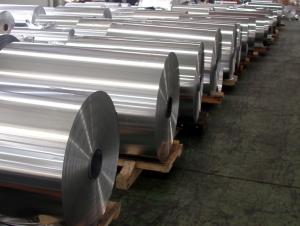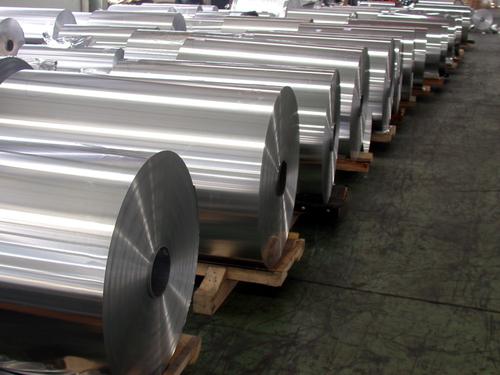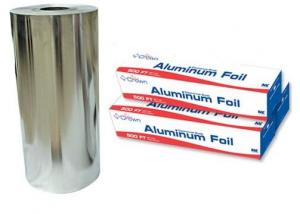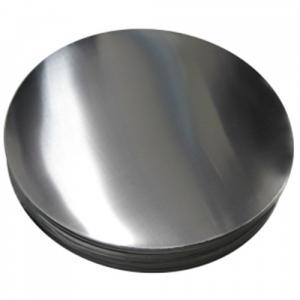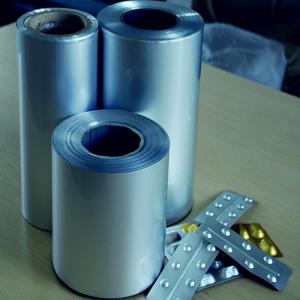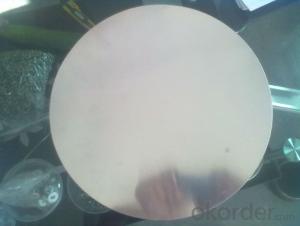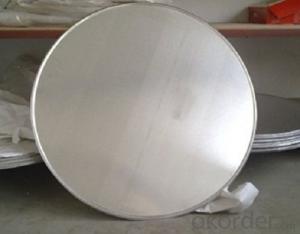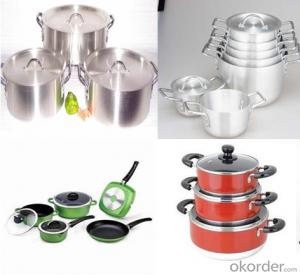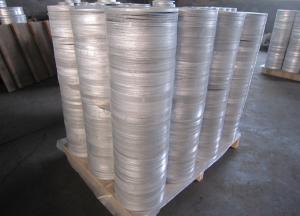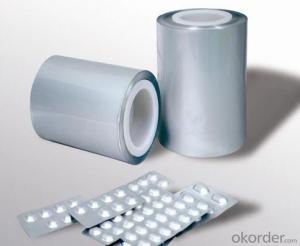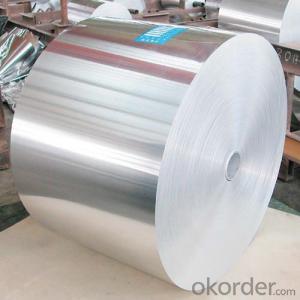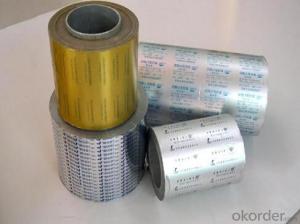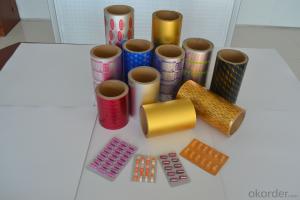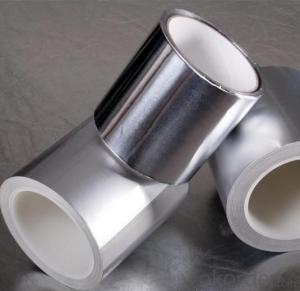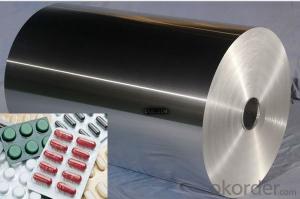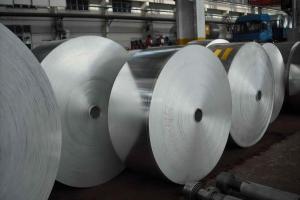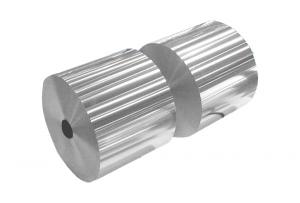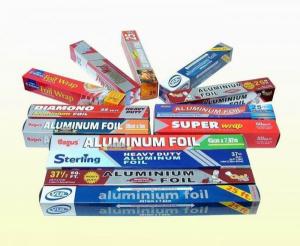Aluminum 8011-O-0.3mm Aluminum Foil Stocks for Pharma Packing
- Loading Port:
- CN
- Payment Terms:
- TT OR LC
- Min Order Qty:
- -
- Supply Capability:
- 7000MT m.t./month
OKorder Service Pledge
OKorder Financial Service
You Might Also Like
Specification:
Alloy No.:1235 8011 8079 1050 1060 1100 1145 3003 5052 5A02 8006
Temper:O H12 H22 H14 H24 H16 H26 H18 H19
Size: Thickness:0.005-0.20mm Width: 50-1600mm
Inner Diameter:76/152mm(Aluminum or Steel Core)
Outer Diameter:550mm Max
Tolerance: thickness tolerance +/-5%, width tolerance +/-1mm
Application:
Food Packing, Household Application, Cigarette Packing, Lamination, Medicine , Printing, Heat Sealing, Beer Packing, Roof Insulation Materials, Honeycome Materials and so on.
Mechanical Property:
Chemical Composite and Mechanical Property are meted with GB/T3198-2003,
ENAW, ASTM, JIS Standard
Surface Quality:
be free from Oil Stain, Dent, Inclusion, Scratches, Stain, Oxide Dicoloration, Breaks, Corrosion, Roll Marks, Dirt Streaks and other defect which will interfere with use
Certificate:
FOOD FDA, ISO9001:2000, SGS and ROHS(if client request, paid by client), MTC(plant provided), Certificate of Origin(FORM A, FORM E, CO.
Packing: First, plastic cloth; Second, Pearl Wool ; Third, wooden cases with drying agent ,without fumigation
Month Capacity: 5000mt / month for Aluminum Foil
Exporting Port: ANY PORT IN CHINA
Trade Terms: EXW,FOB,CIF,CNF
Terms of Payment: T/T or L/C at sight
- Q: This question asks about the interaction between aluminum and electromagnetic radiation, specifically how aluminum influences or is affected by such radiation.
- <p>Aluminum has a high electrical conductivity and is a good reflector of electromagnetic radiation. It reflects a wide range of frequencies, including visible light, ultraviolet, and infrared radiation. Due to its reflective properties, aluminum is used in applications such as reflective coatings for insulation and mirrors. It also has the ability to shield against electromagnetic radiation, making it a common material in the construction of Faraday cages, which are used to block external electromagnetic fields. Aluminum's effect on electromagnetic radiation is primarily through reflection and shielding, rather than absorption or transmission.</p>
- Q: Is aluminum a suitable material for construction purposes?
- <p>Yes, aluminum is widely used in building materials due to its lightweight, high strength, and corrosion resistance. It is common in window frames, roofing, facades, and structural components. Aluminum's malleability allows for versatile design, and its recyclability makes it an environmentally friendly choice.</p>
- Q: What characteristics distinguish pure aluminum from its alloyed forms?
- <p>Pure aluminum is a soft, lightweight, and highly malleable metal with good electrical and thermal conductivity. It is often used for its corrosion resistance and is relatively inexpensive. Aluminum alloys, on the other hand, are made by combining aluminum with other elements like copper, magnesium, silicon, or zinc to enhance its properties. These alloys are stronger, more durable, and can be tailored for specific applications, such as in aerospace, automotive, or construction. They offer improved strength-to-weight ratios, better resistance to heat and wear, and can be anodized for enhanced surface properties. While pure aluminum is more ductile and easier to weld, aluminum alloys provide greater versatility in terms of mechanical properties and performance.</p>
- Q: Is it feasible to use pure aluminum for the production of coins or medals that maintain their longevity and aesthetics?
- <p>While pure aluminum is lightweight and corrosion-resistant, it is not typically used for making coins or medals due to its low melting point and softness. Coins and medals often require materials that are harder and more durable to withstand wear and tear over time. Additionally, pure aluminum is less visually appealing as it does not have the luster or reflective qualities of other metals like silver or gold. Alloys are generally preferred for coinage and medals because they offer better durability, resistance to wear, and can be tailored to have specific properties like hardness and resistance to corrosion.</p>
- Q: Is it possible to join aluminum pieces together using welding techniques?
- <p>Yes, aluminum can be welded. Welding aluminum is a common practice in various industries due to its lightweight and corrosion-resistant properties. Techniques such as Gas Metal Arc Welding (GMAW), Gas Tungsten Arc Welding (GTAW), and Shielded Metal Arc Welding (SMAW) are used. However, aluminum welding requires specific precautions, such as using a clean, dry surface and a proper shielding gas to prevent oxidation, as aluminum readily reacts with oxygen.</p>
- Q: This question asks for methods to protect aluminum from corrosion.
- <p>Aluminum corrosion can be prevented through several methods. One common approach is anodizing, which involves applying a protective oxide layer to the aluminum surface. This process enhances the metal's resistance to corrosion. Another method is using protective coatings such as paints or enamels that act as a barrier against corrosive elements. Cathodic protection, where aluminum is connected to a more easily corroded metal, can also be used. Additionally, ensuring proper design and avoiding contact with aggressive chemicals can minimize corrosion. Regular maintenance and inspection can help detect and address corrosion issues early.</p>
- Q: Explain how the incorporation of titanium into aluminum alloys influences their properties and strength.
- <p>Adding titanium to aluminum alloys significantly enhances their mechanical properties and strength. Titanium increases the alloy's strength, hardness, and resistance to corrosion. It also improves the alloy's creep resistance, which is crucial for high-temperature applications. The addition of titanium refines the grain structure, leading to better ductility and toughness. Moreover, titanium helps to reduce the likelihood of stress-corrosion cracking, making the alloy more reliable in aggressive environments. Overall, titanium-aluminum alloys are stronger, more durable, and have a wider range of applications than pure aluminum or simple aluminum alloys.</p>
- Q: This question asks for examples of industrial processes that incorporate the use of aluminum.
- <p>Aluminum is widely used in various industrial processes due to its lightweight, corrosion resistance, and high strength-to-weight ratio. Some key industrial processes that utilize aluminum include the automotive industry for manufacturing car parts, the aerospace industry for aircraft construction, the construction industry for building materials, the packaging industry for food and beverage cans, and the electronics industry for components in devices. Aluminum is also used in the manufacturing of machinery, electrical equipment, and transportation equipment. Its versatility makes it a crucial material in many industrial applications.</p>
- Q: This question asks for typical applications of aluminum foil in everyday life.
- <p>Aluminum foil is commonly used for food storage, as it helps preserve freshness and prevents freezer burn. It's also used in cooking, either to cover dishes to retain moisture or to create packets for steaming or baking. In the kitchen, it's often used to line baking sheets to prevent food from sticking. Beyond cooking, aluminum foil is used for insulation, in arts and crafts, and even for cleaning purposes, such as buffing glass or polishing silverware. It's a versatile material found in many households and commercial settings.</p>
- Q: Does aluminum have the ability to corrode or deteriorate over time?
- <p>Yes, aluminum can corrode, but it typically forms a protective oxide layer on its surface when exposed to air, which prevents further corrosion. This layer of aluminum oxide is very thin but strong and stable, making aluminum highly resistant to corrosion. However, under certain conditions such as exposure to certain chemicals or in the absence of oxygen, aluminum can still corrode. Corrosion can also occur if the protective layer is damaged or compromised.</p>
Send your message to us
Aluminum 8011-O-0.3mm Aluminum Foil Stocks for Pharma Packing
- Loading Port:
- CN
- Payment Terms:
- TT OR LC
- Min Order Qty:
- -
- Supply Capability:
- 7000MT m.t./month
OKorder Service Pledge
OKorder Financial Service
Similar products
Hot products
Hot Searches
Related keywords
